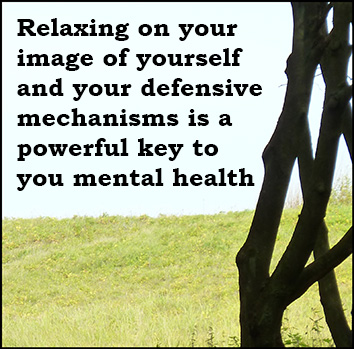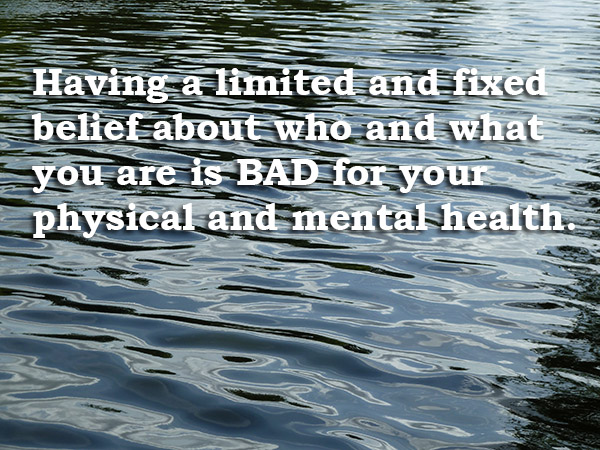Your Mental Well Being
• Tips, tricks, know-how & more to improve your mental health
• Find out how powerful your beliefs & your sense of identity are
• Learn how to deal with your thoughts, beliefs, identity, etc.
• And much more ...
What's Important for Your Mental Well Being?

In personal development, self help, self improvement and spirituality mental health or 'the power of the mind' (thoughts, beliefs, etc.) is often regarded as all important. These things control your experience, so you need to learn to understand and control them.
I do agree, mostly, but just so we're clear: what's truly important is your free will. You know: that thing you use when you choose. That's where your real power resides.
Your free will overrules everything else with regard to your mental health.
But in order to use your free will to improve your mental health you need to understand some important things about thoughts, feelings/emotions, beliefs, memes, free will and more.
Feelings, Thoughts, Beliefs, Memes, Emotions and More
First of all, please remember that your ...• Thoughts
• Feelings/emotions
• Patterns of behaviour (actions and habits)
• Needs/wants
• Beliefs (and memes)
• Entire identity both your chosen identity (ego) & your real identity
... all affect each other in countless ways. When you change one of them (by using your free will), to some extent you change them all. Also, each and every one of them affects your mental health.
I'm going to go into each of those things briefly, and then point you in directions where you can learn more.
Your Thoughts Affect Your Health
Your thoughts are those things that occur inside your head when you think or consider something - which is probably a lot of the time. Often, but not always, we tend to put our thoughts into words inside our heads - which is quite easy to do. Also, thoughts tend to repeat themselves - they run in circles."I think I will eat my breakfast late today" is an example of a thought.
How Thoughts Impact Your Health
Not only your mental health but your physical health and your entire experience of life are affected by your thoughts.For example, research has shown that your thoughts affect your physical body. Fearful, negative, stressed, judgemental thoughts produce hormones and other stuff that over time will literally damage you physically. Loving, positive, calm and accepting thoughts have the opposite effect.

And it is beyond discussion that thinking fearful, judgemental, negative thoughts is an unpleasant experience, while thinking loving, accepting, positive thoughts is a pleasant experience.
Though it seems like thoughts arise all by themselves, you do in fact control them with your free will. Learning to do so is a process, and it may take time, but you can learn it.
The more you repeat a thought the more real [LINK] and true it seems to you. It's still just a thought, though - a mental construct. Thoughts repeated many, many times become habitual thoughts, which coupled with feelings and needs become (some of) your beliefs.
The way you think is largely an acquired habit. And you can change your habits, if you so desire.
Your Habits and Behaviour Affect Your Health
Your behaviour is the things you do - the actions you take. Habits are repeated behaviour that becomes more or less automatic over time.It's pretty obvious that your patterns of behaviour (habits) affect both your mental health and your physical health - just think about your eating, working and sleeping habits. If you don't eat nourishing food, and you work way too hard, and you don't get enough sleep you'll damage both your physical and your mental health.
Your behaviour/actions and habits are based on your thoughts, emotions, needs, beliefs and your chosen identity (who you think you are).
Your Needs Affect Your Health
Your needs want to be satisfied, starting with your survival needs, moving on to your social needs and ending with your spiritual needs.
If you don't satisfy, say your survival needs, it's easy to see that you'll likely to have problems with your physical health. :-)
And if you don't satisfy your social and spiritual needs, you're likely to get problems with your mental health.
Three Important Things Regarding Your Needs
From your childhood you likely carry a subconscious belief that someone else has to fulfil your needs.This is not correct, however: YOU have to fulfil your needs. As already mentioned: If you don't, your physical and mental health will suffer.
Another thing, which is quite difficult to comprehend, is the fact that all your needs are relative. This means that although you experience them as very real, they are not real in an absolute sense. Not only do your needs differ from the needs of other people ... your needs are subject to control by your free will.
This brings us to the third important thing about needs. Since needs are in fact relative you have to define how much is enough! If you don't do this, you risk endlessly and needlessly trying to get more, more, more. This is one of the challenges of the human ego.
Your Feelings/Emotions Affect Your Health
It is quite common that people find it difficult to separate thoughts from feelings. Most likely this is due to lack of knowledge and experience, because there are big differences.
Many people say that while thoughts occur in the head, feelings/emotions mostly occur in the body.
Emotions/feelings are always wordless, but very often we attempt (with some difficulty) to understand them by putting them into words. (Doing so is an excellent idea as long as we don't believe a word that the unpleasant feelings/emotions 'speak').
Joy, anger, love, fear, attraction, disgust, optimism, pessimism, jealousy and gratitude are examples of feelings/emotions.
How Feelings/Emotions Impact Your Health
Just like with thoughts research had shown that feelings/emotions impact strongly on your physical and mental health.Negative, unpleasant emotions = bad for you.
Positive, pleasant emotions = good for you.
And just like thoughts, feelings/emotions seem to arise all by themselves. But contrary to common belief your emotions are in fact subject to control by your free will. You, too, can get insight into this and learn techniques that allow you to do so.
Your Beliefs Affect Your Health
Beliefs are mental constructs - your ideas and assumptions about reality and truth.Assumptions you no longer question. "I believe person X would make a good president or prime minister" is an example of a belief. "I believe that I am not good enough" is another.
A Belief Cannot Be True
Beliefs are NOT reality! Beliefs are NOT the truth! By definition they cannot be - for beliefs exist only in the absence of knowing. If you KNOW something you don't need to believe in it.Your nose is an example of something you do not need to believe in, for you KNOW it is there: You use it every day and you can touch it, feel it and see it (if you squint or look in a mirror).
So, a belief may contain some truth and it may be a part of the truth, but it is not and cannot be the whole truth. It is not and cannot be absolutely real.
You Will Confuse Your Beliefs with Reality
However, due to the nature of human consciousness and relative (personal) reality [LINK] you will tend to experience your beliefs as real and true. You will tend to reinforce the beliefs you have been taught and chosen by seeking out 'evidence' that they are true and ignoring evidence that they are not.Thus you will tend to confuse your beliefs with reality (we all do). If you want personal development (and spiritual enlightenment), one of the quickest and most powerful ways to get that is letting go of your beliefs.
The Memes You Take In Affect Your Health
A meme is an idea, value, belief, symbol, pattern of thought, behaviour, etc. that can be transmitted from one mind to another through speech, gestures, rituals, melodies, pictures, films, television, newspapers, magazines, books, the Internet, etc. It's a bit like a computer program, only the computer it's designed to run on is your brain.Examples of memes include catch-phrases, clothing fashion and beliefs (e.g. religious beliefs). (The word 'meme' was introduced in 1976 by the British scientist Richard Dawkins in his book 'The Selfish Gene').
What Memes Do
Memes can, and do, evolve and spread. You get exposed to a meme, you take it in (i.e. allow its program to run in your brain), and you start imitating it (i.e. running the program) and passing it on to other people. Basically a meme is a cultural unit with the propensities of a virus.You can get 'infected' with memes through any kind of social interaction that you participate in:
How Memes 'Infect' You
Your culture, the people around you, the media (news, books, television, films, posters, ads, e-mails, SMS, Internet, etc.), the government, organizations, organized religion, businesses and many more will all attempt to plant their memes in your mind. Both openly (like 'Buy our product!') and covertly (like governments trying to keep the people they govern in fear, making them easier to control).Most of the time, though, memes aren't spread consciously, but unconsciously. The people who spread them don't even realize they are doing it. That goes for journalists, authors, screenwriters, copywriters, civil servants, business executives and almost everyone else, too.
If, for example, a journalist is writing articles or making a story for the news on television and covering personal tragedies, disasters, terrorism, epidemics, wars and stuff like that which actually has very little relevance for people's daily life, but which will program their brain with fear - this journalist probably has no idea that he or she is perpetuating a fear-based meme. He or she probably just thinks it is 'great news'.
Or, if you have people around you who are always telling you that whatever your dreams and aspirations are, you can't do it; they are most likely just spreading the beliefs and memes they themselves have been infected with.
Memes Are Related to Beliefs
Being mental 'viruses' memes primarily affect your thoughts and beliefs, and since your feelings, decisions, actions and more are all powerfully affected by your beliefs, well, that means that your physical and mental health are affected by memes, too.How to Deal With Memes
The trick to dealing with memes is remaining aware of your 'intake' and your power to decide for yourself.If you watch a movie that is telling you (subconsciously) that being poor is noble and being rich is nasty, you can simply decide to not let that meme infect you.
Your Chosen Identity (Ego) Affects Your Health
Then there's your idea about who you are: your personal 'who am I' beliefs, your relative identity, your ego.Your chosen identity is a part of who you are, but it's not the full truth about who you are. That's why some teachers refer to the ego as 'your false identity'. In any case you are so much more than just your ego. You can experience this for yourself by trying a liberating technique like the Let Go Method.
Your Chosen Identity is a Belief
Also, your chosen identity is a basically a belief, which means (as shown above) that by definition it cannot be absolutely true.And honestly, that a really good thing! Because your idea about who you are is most likely terribly limited and riddled with lousy basic beliefs like 'I am not whole', 'I'm not good enough', 'I'm not important' and 'There's something wrong with me'.
All of which are vicious lies that can and will affect both your physical and your mental health in countless unpleasant ways. A self depreciating relative identity can - and often does - lead to some rather nasty results.
The Truth about Your Mental Health and Your Chosen Identity
The strange but true fact of the matter is this:Having a fixed and limited belief
about who and what you are
(i.e. believing in your ego-personality)
is BAD for your physical and mental health
In other words: The image you are trying to uphold, both inside yourself and towards other people is actually not only limiting you, but also damaging you.
If (deep down, and like most people) you believe you're not whole, not good enough and not important, for example, are you going to treat yourself well, do you think? I don't think so, because you'll be convinced that you don't deserve it.
Your REAL Identity Affects Your Health
Your REAL identity, which can actually be stated in so few words, that's it's highly likely you won't understand a word of it is this:I AM. That's it. You exist. That's all that's needed. You don't need to define yourself any more than that. In fact it's better for your physical and mental health if you don't.
The Truth about Your Mental Health and Your Real Identity
The strange but true fact of this matter is:NOT having a fixed and limited belief
about who and what you are
(i.e. NOT believing in your ego-personality)
is GOOD for your physical and mental health
Put differently: If you DON'T try to uphold an image about who you are, neither inside yourself nor towards other people, but simply exist as who you authentically are (i.e. without all your usual defence mechanisms) and act from this, you'll be more calm, more efficient, more attractive, plus happier and healthier. And your life will be much, much easier. Among other nice things.
Imagine that: Just being you, and doing it, too. Never having to try to second-guess what other people expect of you. Always being honest, never having to lie again. Actually doing the kind of work that you love. Not being stressed anymore. Truly not caring if other people call you an idiot, or lazy, or stupid, or aggressive, or ugly, or whatever you don't want to be identified with right now.
All It Takes ...
All it takes is that you drop your image, your ego-identity and all of its defence mechanisms; and instead just exist as no particular person other than who you authentically are.
Of course the very idea of doing this is likely to scare the pants off of you. Which is why you don't do it. You are afraid. Fear is limiting you. Stopping you. As it so very often does, even though there truly is nothing to be afraid of.
In Conclusion
While thoughts, feelings/emotions, needs and behaviour/actions/habits certainly do affect your (physical and) mental health in varying degrees, the most powerful of improving your mental health concerns your beliefs (and memes) and your identity.
The second most powerful key to your mental health is letting go of your beliefs, starting with the ones that are most self-depreciating and limiting.
The most powerful key to your mental health is relaxing your internal and external image, your chosen (ego) identity and your defensive mechanisms. That's why there's so much focus on the ego in spiritual traditions that are aimed at spiritual enlightenment.
No matter how you choose to proceed, the thing you need to remember is this:
Anything that brings your mental state closer to absolute reality will improve your mental health.
It's as simple - and as scary - as that.
The Personal Development Guy's Self Improvement Ezine (FREE)
Would you like to keep in touch - and get high-level tips and special bonuses? Then please sign up for my self improvement newsletter The Personal Development Guy's Self Improvement Ezine. It is totally FREE.
I LOVE Your Support
If you've found the free personal development content on this website useful, please click the Donate button. Your donation will help me to keep producing free, high-level self improvement information. I am VERY GRATEFUL for your support!
Inspirational Quotes, Poems and Funny Short Stuff
If you want, you can also get your personal development, spirituality and general wisdom in an ultra light version - or even add your own wisdom to the site. Just go to the other sister of this website at:
- World's Best and YOUR Best Quotes, Poems and Short Funny Stuff
Quotescoop.com is also known as:
(http://www.inspirational-quotes-short-funny-stuff.com).
High-Level Positive Parenting Advice and Deep Insights
Positive Parenting Ally is the parenting equivalent of the Personal Development Guy. This is where you go if you want really deepen your understanding of parenting, empower your kids and make everyday life more easy and joyful.
Positive-Parenting-Ally.com
- Parenting advice for the conscious, open-minded parent!
Back to the top of this page about Your Mental Health
Where Would You Like to Go Next?
To see what has been added to this site recently (plus offers, etc.), check out Blog & News at PersonalDevelopmentGuy.comYou might also like to read something related at the page Be Yourself, or at the page Empowerment Theory, or at the page Letting Go
Jump to the Personal Development Guy Homepage







